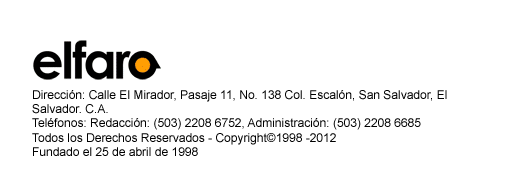SCENESETTER FOR VISIT OF SALVADORAN PRESIDENT SACA
Publicado el 24 de Mayo de 2011
id: 97341
date: 2/20/2007 16:36
refid: 07SANSALVADOR298
origin: Embassy San Salvador
classification: SECRET
destination:
header:
VZCZCXYZ0001
OO RUEHWEB
DE RUEHSN #0298/01 0511636
ZNY SSSSS ZZH
O 201636Z FEB 07
FM AMEMBASSY SAN SALVADOR
TO RUEHC/SECSTATE WASHDC IMMEDIATE 5230
INFO RUEHZA/WHA CENTRAL AMERICAN COLLECTIVE IMMEDIATE
RHEHNSC/NSC WASHINGTON DC IMMEDIATE
----------------- header ends ----------------
S E C R E T SAN SALVADOR 000298
SIPDIS
SIPDIS
E.O. 12958: DECL: 02/16/2017
TAGS: PGOV, PREL, OVIP, KCRM, KHLS, ES
SUBJECT: SCENESETTER FOR VISIT OF SALVADORAN PRESIDENT SACA
Classified By: Ambassador Charles L. Glazer, Reasons 1.4 (b) and (d)
Introduction
-------------
1. (S) President Elias Antonio "Tony" Saca is likely to
emphasize his concerns over Venezuelan and Iranian threats to
regional stability and press for extension of TPS during his
February 27 meeting with the President. Saca will also raise
gang violence, deportation of Salvadoran criminal aliens,
Major Non-NATO Ally (MNNA) status, and El Salvador's
deployment of the eighth contingent of its Cuscatlan
Battalion to Iraq. While in Washington, Saca plans to lobby
members of Congress from both parties to support immigration
reform. We hope that the President will thank Saca both for
his insights on hemispheric politics and for Iraq,s support
in Iraq, while also pressing the Salvadorans to move with
determination on the question of public security. We also
hope that the President will urge Saca to put factional
politics aside and press to nominate ARENA,s strongest
candidate to run in the 2009 presidential election.
Regional Challenges
--------------------
2. (C) Saca is increasingly concerned about the direction
in which Latin America is headed, and is especially worried
about Central America now that the Ortega administration in
Nicaragua has been added to the tide of the leftist populism
in the region. He contends that Venezuela and Cuba directly
back El Salvador's hardliner-dominated FMLN, and will attempt
to interfere in El Salvador's critical 2009 presidential,
legislative, and municipal elections. The FMLN maintains
strong ties with the new Ortega Administration. Although El
Salvador was the first country to ratify CAFTA, and will
receive over $461 million in Millennium Challenge Account
funds, economic benefits have been slow to kick in, and MCC
spending will begin to register only shortly before the next
election.
3. (S) Saca is likely to raise the additional threat of
expanding Iranian influence in the region. Saca and his
advisers have shared with the Ambassador, and during Attorney
General Gonzales's recent visit, their fears regarding this
threat, citing recent travel of Salvadoran Shiites to Iran
via Venezuela. For this reason, the GOES is preoccupied
about the March 2 inauguration of a Tehran-Damascus-Caracas
commercial air route. In Saca's words, the recent visit of
the President of Iran to Nicaragua "piqued their radar."
Saca adds that Salvadoran support of coalition forces in Iraq
makes them feel more vulnerable to the Iranian threat.
Gang Violence and Deportations
------------------------------
4. (C) Reliable polls show that violent crime is now
Salvadorans' leading concern; gang violence accounts for as
much as 60 percent of all violent crime. Ten to twelve
Salvadorans are murdered every day; El Salvador's 2006
homicide rate of approximately 57 per 100,000 population was
the Western Hemisphere's highest, and indeed likely the
world's worst outside of active war zones. The USG is
helping the GOES to combat gang violence in many ways,
including AG Gonzales's recently-announced initiative to help
establish a Transnational Anti-Gang Unit (TAG), better
regional cooperation in sharing fingerprints of violent
criminals (the CAFE initiative), support of major judicial
reforms to increase conviction rates, technical assistance to
improve evidence collection and management, extensive
training at the International Law Enforcement Academy (ILEA),
and better information sharing between DHS and the GOES
regarding deportees' criminal background (the new E-Travel
Document program).
5. (C) Despite this intensive collaboration, the Saca
administration has still not shown the political will to make
tough decisions about improved tax collection, together with
more robust investment in public security, in order to stop
violent crime. In fact, on February 10 Foreign Minister
Lainez called the Secretary to propose a poorly thought-out
"debt for security" swap. High-ranking Saca administration
members, including Minister of Public Security and Justice
Rene Figueroa (Saca's favorite as ARENA's 2009 presidential
candidate), tend to blame the United States for the violent
crime situation, citing the deportation of violent criminals
back to El Salvador. This remains one of the few points of
friction in our otherwise strong bilateral relationship, and
post has aggressively lobbied the GOES to accept the E-Travel
Document, OAS Prisoner Exchange Treaty, and possible
extradition of the gang leaders to face charges in the U.S.
as possible areas for greater collaboration. These USG
proposals have been offered since Saca raised these issues
with the President and the National Security Adviser in
September, on the margins of the UN General Assembly. Saca
may also express concern that convicted criminals are making
deals with state prosecutors to accept deportation to El
Salvador, in exchange for early release.
Temporary Protected Status
--------------------------
6. (C) Roughly 250,000 Salvadorans have benefited from TPS,
which has been renewed four times since it was instituted in
March 2001 in response to two deadly earthquakes. President
Saca views further extensions of TPS as one of his top
priorities. Without an additional renewal, TPS will expire
in September 2007. El Salvador continues to rebuild
infrastructure damaged or destroyed by the earthquakes, plus
subsequent damage from October 2005 and December 2006 natural
disasters. Only two of the seven hospitals destroyed in 2001
have broken ground to rebuild; the other five are still in
the design and procurement stage. The cost of reconstruction
has diverted resources from other productive activity and
critical needs, such as public security, public health,
nutrition programs, and education. El Salvador continues to
suffer from high unemployment and underemployment.
Major Non-NATO Ally Status
--------------------------
7. (C) GOES Minister of Defense Romero remains interested in
the possibility of El Salvador receiving Major Non-NATO Ally
(MNNA) status; Salvadoran forces' significant participation
in Iraq (which has included five fatalities) has raised the
profile of this issue within military and other government
circles. Post supports MNNA as an important symbolic
designation for one of our most reliable allies. Saca may
raise MNNA during his visit.
Iraq Deployment
---------------
8. (C) The eighth contingent of El Salvador's Cuscatlan
Battalion has just arrived in Iraq; over 3,000 Salvadoran
troops have now served with the U.S.-led coalition, and El
Salvador remains the sole Western Hemisphere nation
participating in Operation Iraqi Freedom (OIF). Although
polls indicate that the government's deployment of troops to
Iraq is unpopular with a majority of Salvadorans, post
believes the Saca Administration will continue to expend
political capital to keep Salvadoran forces in the coalition.
In December 2006, the nation's Legislative Assembly voted a
one-year extension of authorization for deployment of troops
to Iraq. Positive press coverage of the troop rotation in
leading media has underscored the Salvadorans' excellent
reconstruction work; local Iraqi leaders in Al Kut have been
shown expressing their gratitude to El Salvador. By all
accounts, the Iraqi government would like to have more
Salvadoran troops participating in the coalition.
Butler
=======================CABLE ENDS============================




